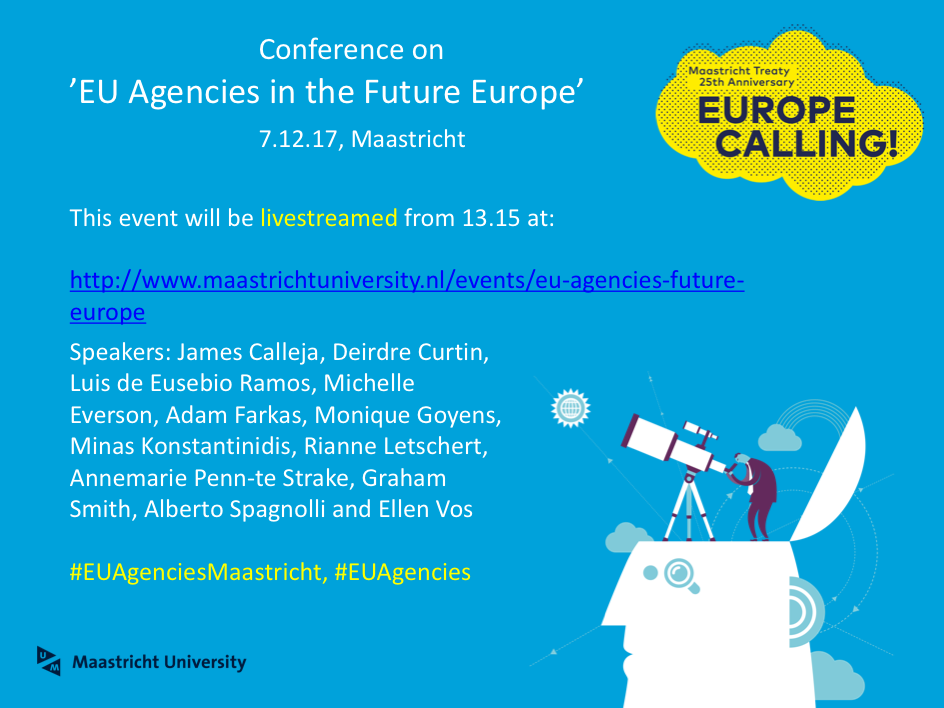7 December 2017: Debate on the role of EU agencies in the Future Europe
REGISTRATION CLOSED: In 2017 the City of Maastricht, the Province of Limburg and Maastricht University commemorate the 25th Anniversary of the Maastricht Treaty by means of a series of events under the heading Europe Calling. The debate on the role of EU agencies in the future Europe takes place within the framework of the Europe Calling programme.
In 2017 the City of Maastricht, the Province of Limburg and Maastricht University commemorate the 25th Anniversary of the Maastricht Treaty by means of a series of events under the heading Europe Calling. The debate on the role of EU agencies in the future Europe takes place within the framework of the Europe Calling programme.
What do EU agencies do? Do EU agencies need to be controlled more or better? Do EU agencies need to be more independent? Are EU agencies sufficiently transparent? Do EU agencies need to be merged? Is the model on which EU agencies are based in terms of expertise still sufficient for the future? Do EU agencies need to be spread geographically all over the EU? Do EU agencies need to connect more to citizens? Can EU agencies bring Europe closer to its citizens? These and many other questions will be discussed during this debate.
Event: (livestream)
12.45-13.15: Registration
13.15-13.30: Welcome by the Mayor of Maastricht and the Rector of Maastricht University
13.30-13.45: EU Agencies on the Move: The position of EU Agencies in the EU Institutional Landscape by Ellen Vos, Professor of EU law, Maastricht University
13.45-14.45: EU Agencies: Mission, Tasks and Future with presentations by:
- Berndt Körner, Deputy Executive Director, Frontex, the European Border and Coast Guard Agency
- Robert Wainwright, Executive Director, Europol
- Michael O'Flaherty, Executive Director, Fundamental Rights Agency
- Adam Farkas, Executive Director, European Banking Authority
- Alberto Spagnolli, Head of the Executive Office Unit, European Food Safety Authority
14.45-15.15: Coffee break
15.15-17.00: EU Agencies: Challenges Ahead (moderated by Ellen Vos, Maastricht University)
Round Table Discussion with directors of EU agencies and audience:
- Bernhard Url, chair of the EU Agencies Network and Executive Director of European Food Safety Authority
- Emily O'Reilly, European Ombudsman
- Jeroen Lenaers, Member of the European Parliament
- Pierpaolo Settembri, Assistant to the DG MOVE, European Commission
- Monique Goyens, Director General, European Consumer Organisation, BEUC
- Deirdre Curtin, Prof. of EU law, European University Institute
- Michelle Everson, Prof. of EU law, Birkbeck University, London University
17.00-18.00: Closing by Ellen Vos followed by a reception
EU Agencies
The European Union cannot be imagined without EU agencies; it simply cannot function without them. European agencies perform a key role in the European integration process. These agencies, denoted recently by the Council, Commission and Parliament as decentralized agencies, deal with complex technical and scientific issues by providing expertise, they introduce more, and more flexible, administrative capacity and efficiency. They facilitate, coordinate and strengthen cooperation between national authorities, (re)gain trust and credibility, improve implementation, supervision and increase networking and participation of more actors, such as stakeholders and citizens.
EU agencies adopt important legally binding decisions for both the European economy and its citizens, deciding about the registration of European trademarks, plant varieties and certain chemical substances as well as about the airworthiness of airplanes. And, where they do not have legally binding decision-making powers, they do influence EU decision making to a great extent, for example with their scientific opinions on the safety of foods and medicines, chemicals, most of which are followed by the European Commission. Even agencies that merely collect data play a key role, as this data gathering guides the EU in its policy and decision making.
EU agencies thus are critical for European integration, for the EU’s economy and the wellbeing of its citizen. With the mushrooming of EU agencies, and the agencification of EU executive governance, queries arise as regards the position of EU agencies within the EU institutional structure and their relation with the Member States; as well as their accountability, control and institutional co-ordination; all this against the background of the upcoming reform of the EU in the aftermath of Brexit.

